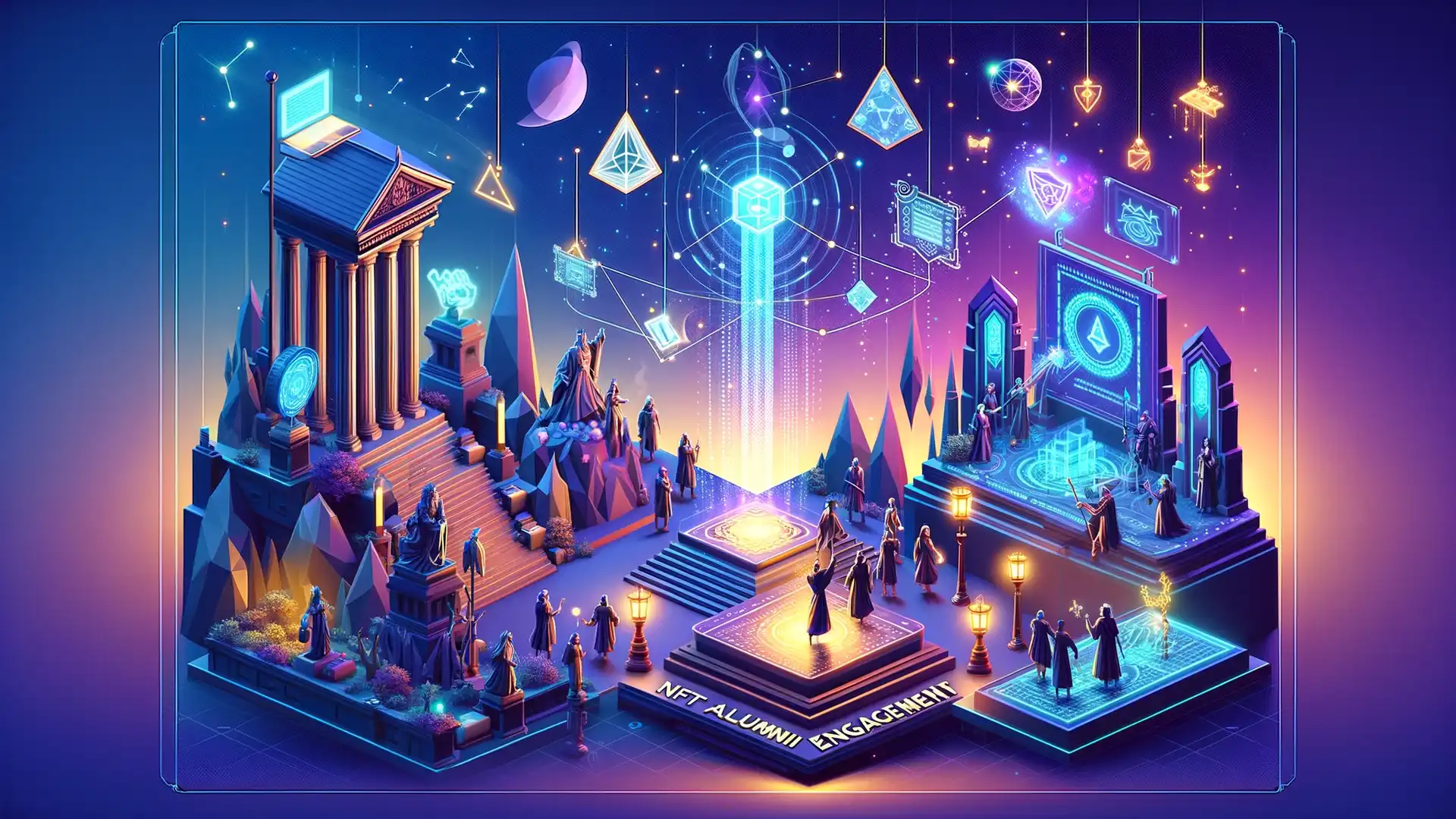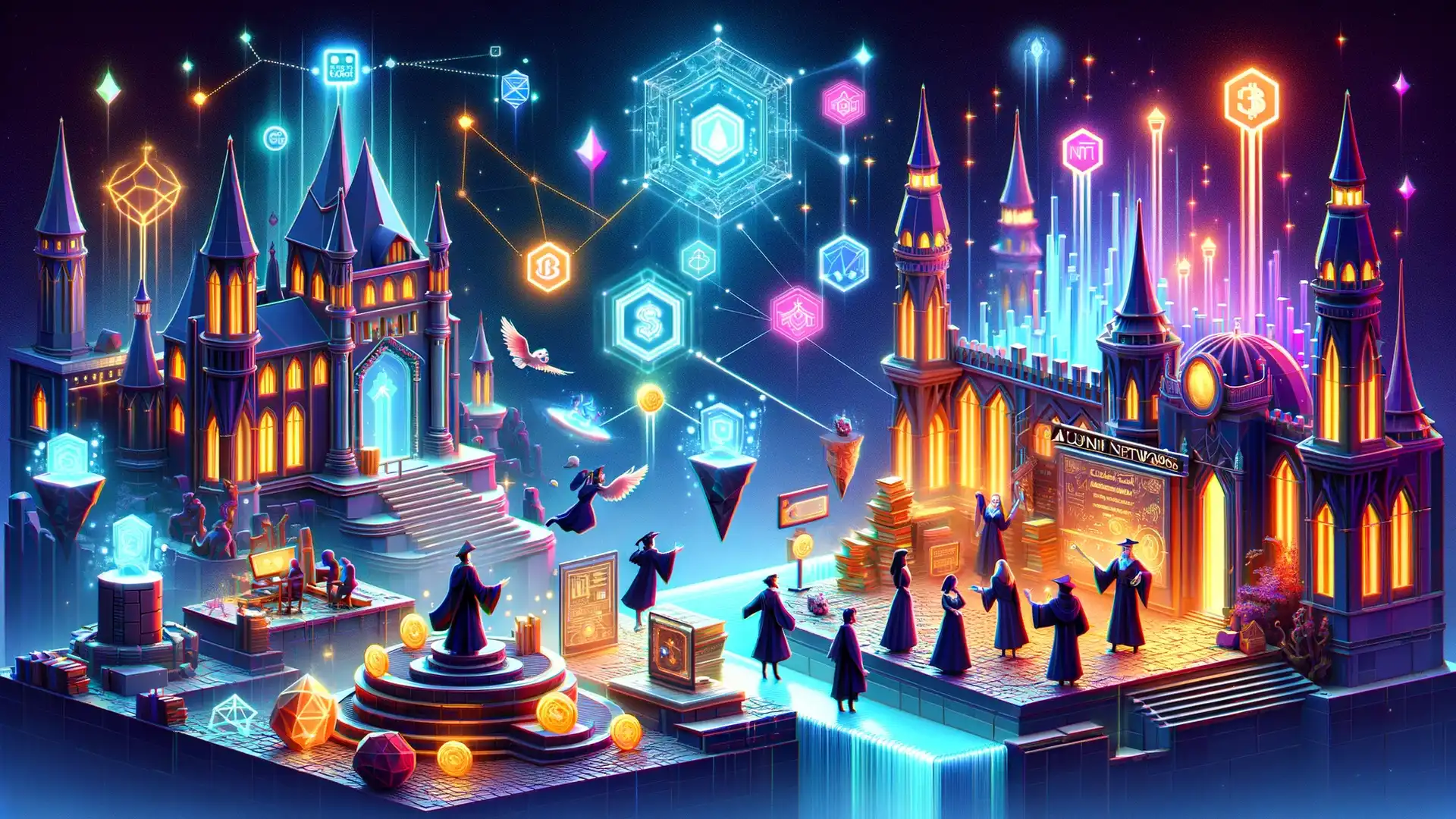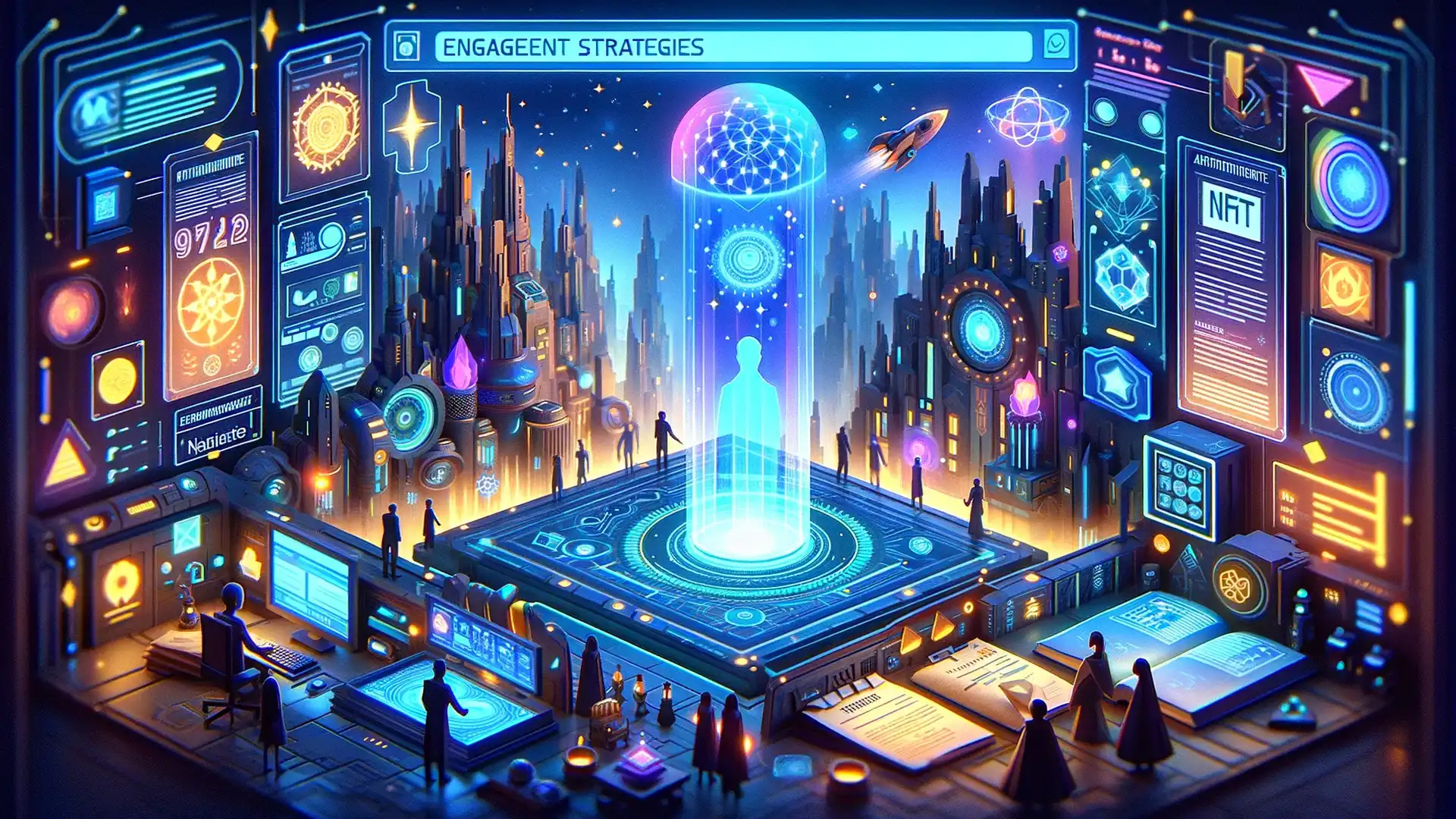Enhancing Alumni Engagement Through NFT Credentials

 Author:
Artem Grigoriev
Author:
Artem Grigoriev
NFT Credentials: Revolutionizing Alumni Engagement and Interaction
Imagine holding a digital diploma that is impossible to lose or fake. This is the revolutionary promise of NFT (Non-Fungible Token) credentials . Unlike traditional paper certificates, NFT credentials are unique and tamper-proof . This is thanks to advanced blockchain technology.
📘 This article complements: "The Complete Guide to NFT Credentials". Explore it to find answers to all your questions;)
Blockchain is a secure system that records information in a way that makes it difficult to change. This ensures each credential is genuine and verifiable. Each credential is a digital token issued on a secure blockchain platform. This guarantees its uniqueness and ease of verification.
Leading universities worldwide, such as MIT and Stanford, are already exploring this cutting-edge technology. They aim to secure and verify academic records effectively ( MIT News ).
Creating NFT credentials involves issuing a digital token on a blockchain. This digital ledger records transactions across many computers. This meticulous process ensures each credential is unique and cannot be duplicated, making them easily verifiable.
By leveraging blockchain, these credentials offer enhanced security. They protect sensitive information and ensure only authorized individuals can access them. This level of security builds robust trust among alumni. It makes it easier for them to connect and collaborate with confidence.
The World Economic Forum highlights blockchain's potential in securing academic credentials. It emphasizes its critical importance in modern education. Moreover, this technology can help institutions combat credential fraud, ensuring that qualifications are genuine and trustworthy.
Traditional methods of verifying alumni achievements can be cumbersome and vulnerable to fraud. NFT credentials streamline this process . They allow for quick and accurate validation of an alumnus's accomplishments. This enhanced verification capability strengthens alumni networks, fostering trust and authenticity. It makes it easier for alumni to form meaningful connections based on verified credentials.
The immutability of blockchain records ensures the credentials cannot be altered. This maintains the integrity of the achievements. This is particularly valuable in professional environments, as verified credentials can significantly impact career opportunities.
Personalized alumni experiences are another significant benefit of NFT credentials. Alumni can receive custom-tailored communications and opportunities based on their verified credentials. This enhances their sense of belonging within the alumni community.
💡 Note: Blockchain technology underpins the security of NFT credentials. It ensures data privacy and ownership while preventing unauthorized alterations. According to a report by Deloitte , blockchain can significantly reduce fraud and enhance the credibility of educational qualifications. Institutions adopting this technology can position themselves at the forefront of educational innovation. They can provide alumni with credentials that are both prestigious and secure.

Imagine receiving a notification about a job opening or an event suited to your qualifications and interests. All this is facilitated by your NFT credentials. This level of personalization fosters a deeper connection between the institution and its alumni. It promotes continuous engagement and mutual growth.
Additionally, personalized learning pathways and professional development opportunities can be tailored to each alumnus, creating a lifelong learning environment.
Gamification and rewards further enhance alumni engagement. NFT credentials can be used to create digital badges and leaderboards . They offer exclusive access to events or content. These engaging experiences incentivize alumni participation. They boost loyalty and support.
For example, a university might issue NFT diplomas that alumni can showcase on professional platforms like LinkedIn. This adds a layer of prestige and verifiability to their credentials. LinkedIn's integration with blockchain-based credentials underscores the growing acceptance and value of these digital certifications in the professional world. This integration enhances an alumnus's professional profile, increasing their visibility and credibility in the job market.
Real-world examples highlight the successful implementation of NFT credential programs. Educational institutions and alumni associations have leveraged NFTs to enhance their engagement strategies. This has resulted in increased participation and stronger alumni networks.
For instance, a university could issue NFT-based certificates for completing online courses. Alumni can proudly display and share these certificates. Institutions like the Southern Alberta Institute of Technology (SAIT) have already started issuing blockchain-based credentials. This demonstrates the practical application and benefits of this technology ( SAIT News ). These initiatives show how NFT credentials can be a powerful tool in fostering a connected and engaged alumni community.
The future potential of NFT credentials in alumni engagement is immense. Institutions will continue to explore innovative engagement strategies. NFTs will play a crucial role in creating more connected, secure, and engaged alumni communities. By leveraging the unique properties of NFTs, institutions can foster deeper connections and loyalty among their alumni. This paves the way for robust support networks and dynamic interaction.
Additionally, the adoption of NFT credentials can set a precedent for other sectors. It showcases the versatility and impact of blockchain technology beyond academia.
💡 Tip: Institutions considering NFT credentials should evaluate their technological infrastructure. They need to ensure they have the necessary legal and regulatory frameworks in place. This preparation is crucial to navigate the complexities and ensure the smooth implementation of NFT-based systems. Furthermore, collaboration with blockchain experts and legal advisors can help institutions address potential challenges. This will maximize the benefits of this transformative technology.

Leveraging NFT Credentials: Best Practices, Benefits, and Future Trends
Adopting NFT (Non-Fungible Token) credentials can transform how institutions engage with their alumni. This offers numerous strategic benefits and future opportunities. To ensure the successful implementation of these advanced digital credentials, institutions must follow best practices. This will maximize their effectiveness and impact.
Best practices for implementing NFT credentials start with selecting the right blockchain platform. This platform should provide robust security features and a user-friendly interface to facilitate ease of use. Blockchain platforms are digital systems where information is securely stored across many computers. This makes it hard to alter.
Institutions should also offer comprehensive support and education for alumni. This helps them understand the benefits and use of NFT credentials. Transparency about security and privacy measures is crucial for building trust. Piloting NFT credential programs with a small group of dedicated alumni can help institutions gather valuable feedback. They can make necessary adjustments before a wider rollout. According to IBM Blockchain , choosing a secure and scalable blockchain platform is essential. This maintains the integrity and reliability of digital credentials.
Additionally, institutions should establish clear guidelines and policies for issuing and managing NFT credentials. This includes defining the criteria for earning credentials, the process for issuing them, and methods for verification and revocation if necessary. Engaging stakeholders from various departments can ensure that the NFT credential system aligns with the institution's overall objectives. This meets the needs of all parties involved.
One of the key benefits of NFT credentials is their ability to support continuous learning and development . Alumni can earn NFT-based certifications for completing courses, workshops, or other professional development activities. These verifiable credentials serve as concrete evidence of their ongoing education and skills. This enhances their professional profiles and career opportunities.
A study by PwC highlights how blockchain-based credentials can streamline the verification process for employers. This reduces hiring time and improves trust in the candidate's qualifications. Moreover, these credentials can be updated in real-time. They reflect the most current skills and knowledge of the alumni. This is particularly beneficial in fast-evolving industries. Real-time updates mean that as soon as you learn a new skill, it gets added to your profile without delay.
NFT credentials also enhance alumni recognition and reputation . Digital badges and certificates can be displayed on social media platforms, professional networks like LinkedIn, and personal websites. They showcase achievements in a prestigious and verifiable manner. This boosts individual reputations and reflects positively on the issuing institution.
The World Economic Forum notes that digital credentials can significantly enhance the visibility and prestige of educational accomplishments. Institutions can leverage this visibility to attract prospective students and partners. They can highlight their commitment to innovative and verifiable credentialing systems.
Alumni can also enjoy exclusive benefits and access through NFT credentials . Holders of certain NFT credentials might receive priority invitations to events, exclusive content, or discounts on services and products related to the institution. These perks incentivize alumni to stay engaged and encourage active participation in the community.
💡 Note: Institutions should ensure their chosen blockchain platform is secure and provides a seamless user experience. This maximizes adoption and engagement.

The implementation of such benefits has been shown to significantly increase alumni participation rates. This is evidenced by initiatives at leading universities like Harvard and Yale ( Harvard Alumni ). Offering unique NFTs as rewards for active participation or significant contributions can create a sense of exclusivity and pride among alumni. This fosters a stronger emotional connection to the institution.
Integrating alumni data and analytics is another critical aspect of leveraging NFT credentials. By analyzing the data generated through these credentials, institutions can gain valuable insights into alumni engagement patterns, preferences, and needs. This data-driven approach enables more targeted and effective engagement strategies. It ensures that efforts align with alumni interests and motivations.
The use of blockchain analytics can also enhance transparency and trust. This is done by providing a clear record of alumni interactions and achievements. Institutions can use these insights to tailor their outreach programs. They can design more relevant events and create content that resonates with their alumni base.
Future trends in NFT credentials include addressing security and privacy concerns . As NFTs become more integrated into alumni engagement strategies, it is crucial for institutions to select secure blockchain platforms and implement rigorous data protection measures. Staying vigilant about emerging threats and continuously updating security protocols will be essential.
The European Commission emphasizes the importance of regulatory compliance and robust security measures in the adoption of blockchain technologies. Institutions should also consider implementing multi-factor authentication and encryption techniques. This further safeguards sensitive information associated with NFT credentials.
NFT credentials also have the potential to enhance alumni contributions, donations, and mentorship programs . These credentials can recognize and reward alumni donors by creating a transparent and immutable record of their contributions. Mentorship programs can benefit from NFT credentials that verify and showcase the skills and experiences of both mentors and mentees. This fosters stronger connections and trust.
Institutions like the University of California are already exploring the use of blockchain to manage and verify donations. This enhances transparency and donor confidence ( UC Blockchain Initiative ). By integrating NFT credentials into their donation systems, institutions can offer unique incentives to donors. This includes issuing exclusive NFTs that commemorate their contributions, encouraging continued support.
Looking ahead, NFTs could help create a lasting digital legacy for alumni . These credentials can build a comprehensive digital portfolio. This includes academic achievements, professional accomplishments, and contributions to the alumni community. This digital legacy benefits alumni by showcasing their lifelong achievements. It strengthens the institution's network by fostering a sense of continuity and pride.
Additionally, as alumni progress in their careers and personal lives, their evolving digital portfolios can serve as dynamic representations of their growth and success. This further enhances their personal and professional brand.
By staying abreast of these trends and incorporating best practices, institutions can leverage NFT credentials. They can create a dynamic and engaged alumni community well-positioned to support the institution's goals and initiatives. The adoption of NFT credentials represents a significant step forward in modernizing alumni engagement. This ensures that institutions remain relevant and impactful in a digital age.
💡 Tip: Institutions should stay updated on technological advancements. They should collaborate with industry leaders to continuously innovate their alumni engagement strategies with NFT credentials. Engaging with blockchain experts, participating in relevant forums, and staying informed about regulatory changes can help institutions adapt and thrive in the rapidly evolving landscape of digital credentials.

Why NFT Credentials Are the Best Solution for International Students
Multilingual Support and Cultural Adaptation of NFT Credentials
Cost and Pricing Models for NFT Credentials
Investment Prospects in NFT Credentials: For Educational Institutions and Private Investors
Where to Create and Store NFT Credentials: Top Platforms
